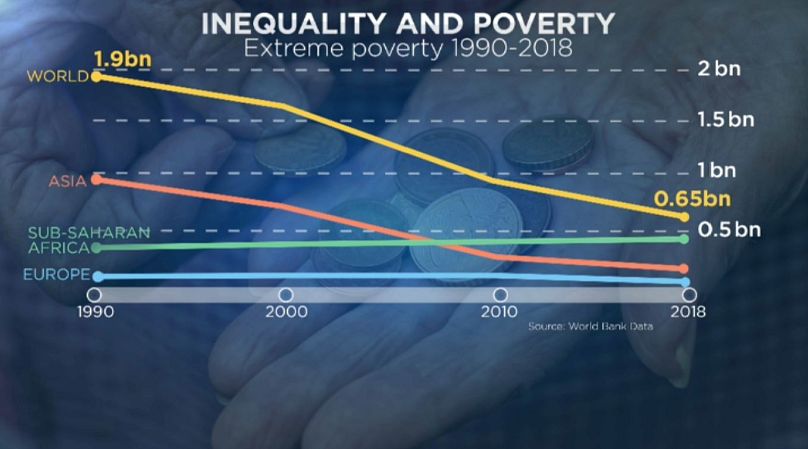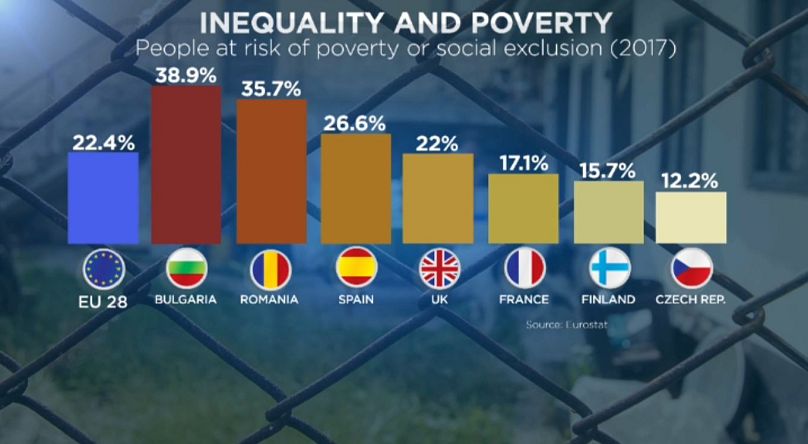Euronews is preparing a special series on inequality and poverty in Europe, key themes of the forthcoming G7 summit in France.
From one perspective, the world is a lot richer than it was.
 ADVERTISEMENT
ADVERTISEMENT
 ADVERTISEMENT
ADVERTISEMENT
Once upon a time, all but a tiny, privileged elite lived in conditions that would be classed today as “extreme poverty”. Now only a minority do live in such a situation – and their numbers are shrinking.
According to World Bank data, back in 1990 the number of people in extreme poverty stood at 1.9 billion – 36% of the world’s population. By 2018 this was estimated to have dropped to 650 million – 8.6% of the world’s population.
The reduction has not been evenly spread: China and South Asia have made huge progress, unlike Sub-Saharan Africa where the number of extremely poor people has grown.
“Extreme poverty” is defined as living on under $1.90 (€1.71) a day. By this measure, Europe and other parts of the world barely register on the scale. Incomes are higher – but so too is the cost of living.
The World Bank has developed a grading system, setting “poverty lines” for different categories of country, relative to national income. In most EU countries this is set at $21.70 (€19.54) a day.
Taking into account material and social deprivation as well, Eurostat figures from 2017 suggested 22.4% of people across the European Union – 113 million people – were at risk of poverty or social exclusion. The rate was even higher for children than the adult population – virtually a quarter were found to be at risk.
Employment used to be seen as a way out of poverty, but some campaigners argue that is no longer the case.
“We’re seeing an explosion of precarious work, zero hour contracts… More and more people are working but are really struggling to make ends meet at the end of the month,” Leo Williams, Director of European Anti-Poverty Network (EAPN), told Euronews.
In January EAPN, which represents many organisations and NGOs, published a major report on poverty and social exclusion in the EU.
Another report from FEANTSA – a European network focusing on homelessness – said alarm bells about rising levels of housing exclusion and homelessness across the EU were not being heeded. It estimates that 700,000 people sleep rough or in emergency accommodation in the EU – 70% more than a decade ago.
Both reports came in the run-up to the deadline for the Europe 2020 strategy – the EU’s agenda for growth and jobs adopted in 2010 – which included a goal of lifting 20 million people out of this category. But latest figures suggest only around five million people have been.
EAPN argues there is a fundamental link between poverty and growing inequality – and it’s now time for world leaders to adopt a new strategy.
“We really see that this is going to need a paradigm shift away from austerity and towards social investment,” Leo Williams says. “The timing is quite good for this now, we have the G7 coming up shortly and new political leaders in the EU as well, so it’s time for them to commit to poverty eradication.”
Euronews correspondents have been examining the impact of poverty and inequality in their countries, and efforts to tackle the problem. We'll have reports from Greece, France, Italy, the UK and also from Africa. Follow our coverage for further developments.
Watch our explainer on poverty, social exclusion and inequality in the video player above.
Read more:
**Greece: social gap widens after economic crisis and bailout programmes
**
**France: Paris' poor suburbs highlight gap between rich and poor
**
What's the G7? A look at the economic summit coming to France
Europe's poverty gap under the spotlight












